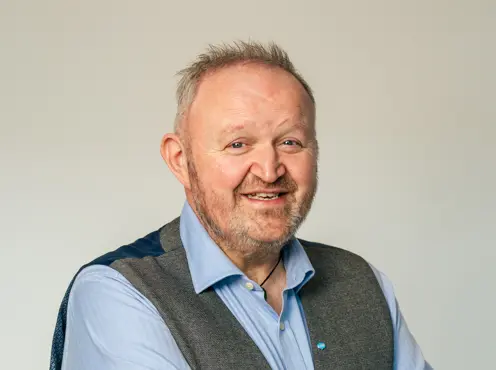View Interview
 Interview
Interview

Perry Timms
Founder and Chief Energy Officer, People and Transformational HR Ltd (PTHR)
Perry Timms has over 30 years of experience in business change and performance, with the last 23 in HR/OD. He ranked Number 1 in HR's Most Influential Thinkers 2022 (his fifth inclusion in that list) and is now in the HR Most Influential Hall of Fame. He is a 4x Engagement 101 Global Influencer, a 4x Guest Professor, a 2x TEDx speaker, and a 3x Author.
Perry is a Chartered Member of the CIPD, a Fellow of the RSA and a Top 100 HR Influencer from Thinkers 360. In 2024, he was honoured with a Lifetime Achievement Award for his work in self-managed, democratic organisations and a Global Culture Icon Award.
Q:You've championed “freedom-centred work” and self-managed systems—how does this philosophy influence the cultural DNA of exceptional organizations?
A:The current paradigm is one of a knowledge/information/creative economy. The mechanical, predictable linearity of the industrial age is eclipsed by the demands of systems that need adaptive, inventive approaches. The command-and-control hierarchical power gives way for more aligned self-interest. As we head into the AI and automation era, the capabilities people will need are relational, handling complex clustered problems and the pace of change. More versatility, agility and imagination suit more self-managed, freedom-centred organisations.
Q:In your view, what is the difference between performative culture-building and transformational culture work?
A:Transformational culture work is where your current culture is absolutely at odds with any reimagined Business and Operating Models. A culture of permission-seeking in a highly inventive and adaptive Business Model would be incongruent. Performative culture-building work is where you are not necessarily doing a recast of the culture but gradually, incrementally, and aligned to the needs of the systems you are operating in through deliberate, incremental additions, adaptations and adjustments to culture. Both need stewarding from people with positional or social capital, and should focus on what culture is - the soul of the organisation. Engage everyone in conscious, measured shifts in behaviours that form into enabling habits, rituals, norms.
Q:What are the most common cultural blockages you've seen when helping organizations transition to more democratic and human-centered ways of working?
A:Power, control, and orthodoxy are definitely the “enemies” of any shift to more democratic and inclusive systems of work. Leaders need to make the space for more dispersed and shared leadership. Managers need to let go and support people to step into more autonomous and self-directed ways to get work done. People need to stop deferring up or ignoring accountability and expecting someone else to step in. Hiding behind jobs happens a lot and when self-management comes into play that's stark and there's no room for wasteful, social loafing and “work theatre”. Clarity and openness are crucial.
Q:You bring 30+ years of experience in change through technology—how has tech influenced cultural cohesion or fragmentation in your experience?
A:Tech is a platform and a tool to enhance the way work is done in more transparent, efficient, and measured ways. Being more coherent and cohesive is critical, and open tech platforms like project management and ERM systems can really help this. By unlocking work to be more “visible” and for progress to be “out loud” and not just shared in meetings or reports. So, the platform-type applications that are open by default for comms, progress, measurement, and completion are critical. Like Scrum or Kanban boards in Agile. Inboxes and closed chat apps create secrecy and mistrust.
Q:What did your research with HR Zone reveal about the real cultural state of HR and OD in organizations today?
A:HR and OD is in a state of overwhelm and underutilisation. Overwhelm in the mechanical linear stasis of dysfunctional retrograde task processes and handovers. OD is underutilised and needs to be at the forefront of more dynamic and adaptive systems of workflow, resourcing, intelligence and effectiveness. HR and OD combine to create the self-managed system transition to that open architecture. Thereafter, HR picks up the complex human capital and relational channels, and OD handles ongoing, systemic innovation and incremental improvements. So, you see less grip and more flowing support and participation. HR and OD can unlock their value in self-managed organisations by not being the dumping ground or hoarding people and culture work.
Q:How do you see the future of workplace culture evolving over the next 5–10 years?
A:Workplace culture will evolve into highly participative, flowing adaptations and continued reinvention as the world shifts through AI, automation, relational and complex systems shifts. Culture is what holds things together whilst processes are in flux and accountability is shared and sometimes unclear in emergent workflow tackling. Problem solving will be by groups who want to solve that problem irrespective of actual role or title, and therefore teams will be more transient, less permanent and more situational project-based squads. Culture will need to be tabled, formed, monitored and adjusted as the team establishes trust
and accountability and makes best use of capabilities, energy and creativity.
and accountability and makes best use of capabilities, energy and creativity.
Q:You've led with purpose for decades—what keeps you energized to transform organizations even now?
A:I sense a purpose renaissance that holds me firm in what I've come to believe is the differentiator in sustainably successful enterprises. New generations and the realisation of existing generations is that the game of work has shifted in its rules, definitions, and expectations. Purpose is the maximiser, elixir of meaning, and the ever present in turbulent times. There's no smugness in thinking “I've always been purpose led so I got here first”. It's a fulfilling sensation that the rest of the working world is now part of a richer symphonic harmony. No solo virtuoso ego - a coming together of fascinating rhythms.
